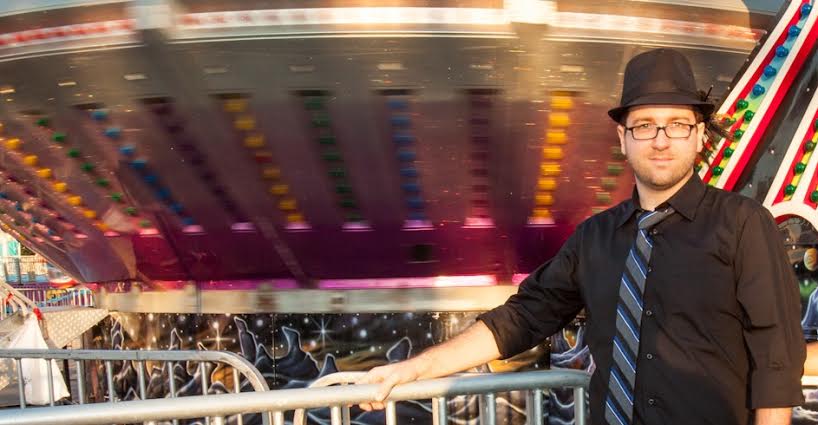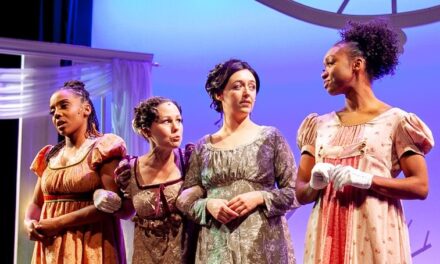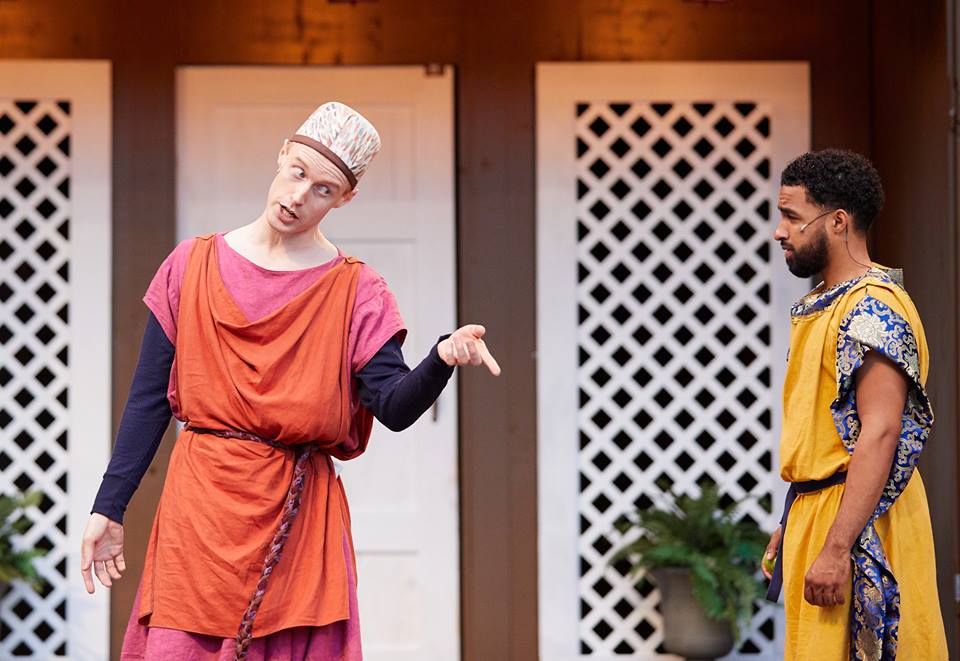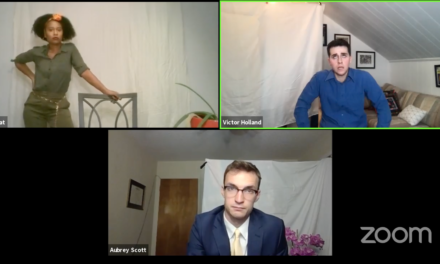Nic Fortin. Photo – Bourbon Baroque.
By Brian Walker
Entire contents are copyright © 2013, Brian Walker. All rights reserved.
John Austin Clark and Nic Fortin are the co-artistic directors of Louisville’s Bourbon Baroque, founded in 2007. It’s an instrument ensemble that performs music from the Baroque period in various locations around the city and has a special affinity for good bourbon. They thrive on collaboration and have partnered with a long list of local organizations for various events, including Squallis Puppeteers, Kentucky Opera and Louisville Youth Choir. They open a performance of Handel’s Messiah at St. Brigid Catholic Church on November 30th.
Brian Walker: You’d be my first musicians for 17 Questions, if you’d both be willing?
John Austin Clark/Nic Fortin: We’d love to. Thanks for thinking of us!
BW: Great. Here we go. Number 1. For folks not familiar with it, how would you describe the mission of Bourbon Baroque?
JAC/NF: Bourbon Baroque, Louisville, Kentucky’s period instrument ensemble, performs the music of the 17th and 18th centuries for the promotion of public interest in the arts, culture and lifestyle of the Baroque through collaboration and strategic partnerships. In fewer words: we play Baroque music on old instruments.
BW: Number 2. Was there an inciting incident that inspired you to start the company?
JAC: My time at Oberlin set the pendulum swinging for the genesis of Bourbon Baroque. I began taking private harpsichord lessons and realized that my interests expanded to include the responsibility of “impresario,” producing and bringing together talent so that great musical moments could be made particularly here in my hometown of Louisville, Kentucky.
NF: I have been in love with the early music performance practice since I was 12. During my graduate studies at McGill University in Montreal, I met Austin, who talked me into bringing this music practice to Louisville. The idea was crazy enough for me to jump on the opportunity and get the chance to discover a new part of the world in music.
BW: Number 3. What’s been the performance (so far) you’ve been the most proud of?
JAC: I am most proud of the projects that highlight our efforts to collaborate with other like-minded arts groups. (Like-minded in their desire to broaden artistic horizons and fuse together talent.) One such project we are actually mounting again this season: Jean-Philippe Rameau’s Les Sauvages, a one-act opera with Squallis Puppeteers serving as the on-stage action, slated for March 21-23, 2014.
NF: Each and every one of them; I get to meet wonderful artists who become my friends during each project. Friendship is your best ally in music making.
BW: Number 4. You’re prepping for a performance of Handel’s Messiah. What’s the biggest challenge for tackling such a well-known and loved piece of music?
JAC: The biggest challenge is for the audience. Our interpretation will be very different than what the Louisville audience is used to. The first part of Messiah recounts the anticipation and coming of the Christ child. So I believe it is important to establish Christ as the playful Messiah of his youth, capturing innocence before the heavy tones of worldly judgment are cast. I think the Louisville patron has come to an understanding of Handel’s Messiah. We expect this understanding to arrive at the concert but hope that it leaves expanded.
BW: Sounds very exciting! Number 5. Will you be accompanying it with any other pieces during that performance?
NF: Yes, since we are only performing the first part, we have paired this headlining work with Corelli’s Christmas Concerto and Johann Sebastian Bach’s Jauchzet Gott in allen Landen, featuring Kelly Ballou, soprano, and Kris Kwapis, baroque trumpet.
BW: Number 6. What’s your favorite brand of bourbon?
John Austin Clark. Photo – Bourbon Baroque.
JAC: If I tell you, then I narrow my field for future corporate sponsorship. Bourbon Baroque: an authentic sound paired with [insert Distillery or Manufacturer]’s authentic original recipe. Sound good? I think so…. I will say I love a good Manhattan but I can also enjoy a simple neat preparation.
NF: “As long as it burns…” (see question 11)
BW: Very nice. Number 7. If you had to condense it down to a few sentences. How would each of you tell your own personal history as a musician up to this point?
JAC: I would like to answer this question in a slightly altered form of Dolly Levi’s monologue from the musical Hello, Dolly: “Music, pardon the expression, is like manure. It’s not worth a thing unless it’s spread around, encouraging young things to grow.” And I do believe that this is true when realizing your purpose in life. You have to share your passion or else it can’t develop its fullest potential. I didn’t really answer your question because I feel that my personal history with music doesn’t matter; what matters is the here and now: what can I give back today because of the history and opportunities I have had with music. Yes, I have studied here and there. Met this person. Heard great performances. Music and I have been at odds with each other. But the ebb and flow we go through together makes it all worthwhile, and I can only hope that this dance is exposed in its most visceral form on stage.
BW: Number 8. Do you compose your own music?
JAC: In some form or fashion, yes. I have not hit my peak on this venture. Composition for me is something that I want to develop into at a later date. I have a lot to soak in as a performing artist and I think no one is going to give a shit about what I compose until it’s completely cooked through. I would hope by age 40 I will have taken this plunge.
NF: I don’t compose new music; however, the study and execution of the historical performance practice requires all sorts of research and knowledge of compositional methods. From music scores on a shelf to the live performance, there are many components towards creating a final product. One specific example: we add ornaments and play cadenzas – improvised passages during final statements of a solo movement, a personal touch to the composer’s original material.
BW: Number 9. When you’re not performing with Bourbon Baroque, what can you most often be found doing?
JAC: Teaching piano and accompanying musicians in their musical quests.
NF: I am a freelance musician in Montreal and Executive Director of Montreal Baroque Festival.
BW: Number 10. What’s your favorite Louisville hangout?
JAC: Holy Grale of course! And it just so happens that is where our rollicking after party will be for Messiah. The party begins right after the Sunday Dec. 1st performance, probably around 4-ish. Patrons are asked to dust off their Messiah scores, crack the binding, and join the musicians as we do an exceedingly loosened rendition of the Christmas portion from Messiah. The idea is that an innocent patron of the Holy Grale will be walking into the bar at the time we are making music from the choir loft. “Where is this lovely music coming from,” they ask. “Oh, that’s Bourbon Baroque!” Cheers!
NF: My friend’s porch with a glass of bourbon.
BW: Number 11. Are there other art forms that either of you draw particular inspiration for your own?
JAC: DANCE! Baroque music is steeped in dance rhythms. The only way to truly understand and interpret music is to be able to move and be moved. This applies to all music. Hands down.
NF: I love movies form the Hollywood Golden Age!!!
BW: Number 12. What’s a piece of music you’ve not performed yet for an audience but want to before you die?
JAC: Here’ s a crazy thought: a staged performance of Igor Stravinksy’s The Rake’s Progress accompanied by Bourbon Baroque. Rake was composed during Stravinksy’s Neo-classical period and contains many elements of the Baroque/Classical form. The libretto is based on the etchings of the Baroque satirical artist William Hogarth. So, the ideological fusion in this production would be overwhelmingly delicious paired with a period band.
NF: An entire tragédie lyrique by Lully with great costumes, dancers and gods descending from the ceiling.
BW: Number 13. Who is your favorite modern pop star?
JAC: Jessie J. She’s hot.
NF: Diane Dufresne. A great singer from Quebec, better than Celine…
BW: Number 14. Is there a performance hall (or anywhere for that matter) in Louisville you haven’t performed in but would love to?
JAC: The Motherhouse at Sacred Heart. Unfortunately, the nuns have quite the death grip on their place of worship. Yet, the acoustic in there is dynamite!
NF: A little gem of a place nobody knows about.
BW: How mysterious… Number 15. What advice would you give to musicians looking to start their own performance group?
JAC/NF: Be patient and surround yourself with kind people.
BW: Number 16. What’s one thing folks would be surprised to learn about you?
JAC: I kissed a girl and I liked it.
NF: ABBA rocks! Seriously.
BW: Number 17. Who is someone who inspires you and why?
JAC: My musical colleagues inspire me daily. Without their love, support, and harsh reality checks I would have a hard time realizing how fortunate I am. My mother always says, “You have your music.” And, it’s true. No wiser words were spoken in my quest for happiness.
NF: All musicians who dare to live their passion as I try to do every day. As Bette Davis said in All About Eve: “Fasten your seat belt; it’s going to be a bumpy night!”
Bourbon Baroque presents Handel’s Messiah, and other seasonal works for choir and orchestra
Saturday, November 30 at 7:30pm
Sunday, December 1 at 2:00pm
St. Brigid’s Catholic Church
1504 Hepburn Avenue
Louisville, KY 40204
Tickets: $20 502-641-1787





